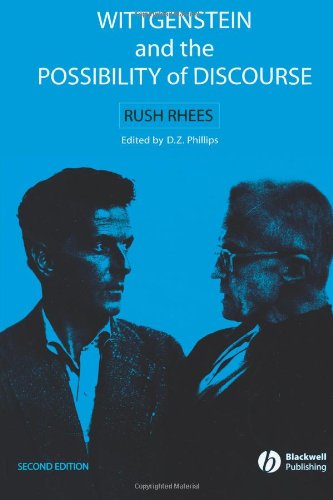by Rush Rhees
I have made mention of this book before. The book played a central role in the journal entry, "To Understand You Need to Be Part of The Conversation". In short, Rush Rhees emphasises that the learning of language is much more than the mastering of techniques. Instead, becoming a language speaker involves a commitment to the discourses (e.g. the concerns, the topics, the discussions) that occupy communities of speakers. In the chapter, "Plato, language and the growth of understanding" Rhees states,
"The people who argued with Socrates and Plato may have thought language was just a collection of techniques, and that that was what understanding is: knowing the technique ... For them, the growth of understanding could only mean the growth of skill (efficiency, I suppose) or the multiplication of skills ... A skill would have the sort of unity that a calculus does ... Is understanding just competence?" (pg. 3)
By ending with a rhetorical question, Rhees is expressing some doubt in the idea that understanding is a measure of technical proficiency. It is true that language & literacy involve technical skills. Learning how to spell can be considered to be a technical skill. Knowing how to parse a sentence is also a technical exercise. But is technical mastery that which engenders comprehension? Rhees' reply would be "no", and he would follow with,
"If you understand anything in language, you must understand what the dialogue is, and you must see how understanding grows as the dialogue grows ... For language is discourse, is speaking. It is telling people things and trying to follow them. And that is what you try to understand ... You understand when it adds to your understanding of the discussion. Or of what the discussion is about." (pg. 7)
Therefore, even rich, vivid propositions in language do not convey meaning simply by what they represent. The proposition gains meaning by how that proposition fits within the conversation (Rhees' term) or language game (Wittgenstein's term). Emphatically, meaning is not representation. Meaning is use. This should quickly conjure up images of Wittgenstein's Philosophical Investigations. In fact, Rhees spoke at length with Wittgenstein about the Philosophical Investigations. Rhees admired Wittgenstein's probing philosophy. In many ways, this book is Rhees' attempt to clarify Wittgenstein's language game concept, a concept that Rhees found to be unnecessarily vague and which could be better understood if we replaced it with terms like discourse, conversation and discussion.
Rhees uses the words conversation and discussion in quite specific manners throughout the book. He wants his readers to imagine situations in which speakers are dynamically involved in give-and-take exchanges that move participants to clarify understandings, develop pictures, and answer questions - stated directly or indirectly - that govern the current discussion. In other words, there is an ongoing discussion of, let's say, nature and love, and it so happens that an event (e.g. like the recitation of a sonnet) takes places amongst a community of people who have the desire to explore these questions, themes or knowledge. For these people, the bigger discussion matters and - consequently - the particular discussion, which takes places around - in this case - the sonnet, also matters.
"The principal question has been regarding my reasons for saying you could not have one conversation unless you had others ... I questioned this because I thought that it was necessary if [people] are to speak and understand the sorts of things that are said in conversations, it would be true that [these people] would speak in other connexions in the lives they are leading as well ... There must be [some significance and relationship] if their conversation is to be a conversation at all and not [just a wallpaper pattern or] something like a dance." (pg 173)
Therefore, to make sense of the particular requires that one can make sense of the broader practices and their significance. To become a speaker in a community (to be understood in that community) one also needs to be engaged with the concerns and activities that occupy that community's way of life. This premise shouldn't strike us as odd; however, it is another challenge to the analytical tradition that Wittgenstein steered away from in his later philosophy. This later perspective understood that the broader non-verbal context provides the foundation for verbal events to be significant.
Wittgenstein and the Possibility of Discourse is an insightful book that is written by one who knew Wittgenstein well and who sought to extend and clarify Wittgenstein's ideas.

